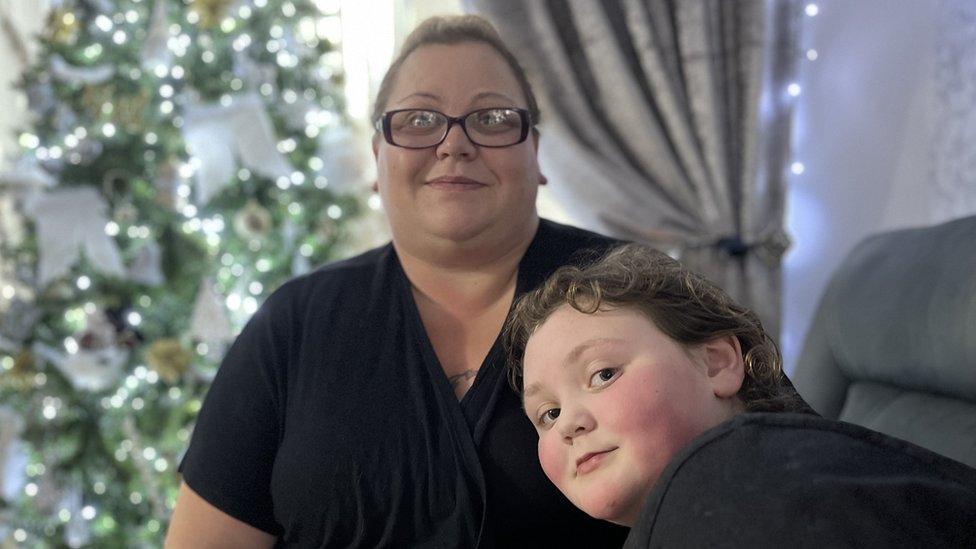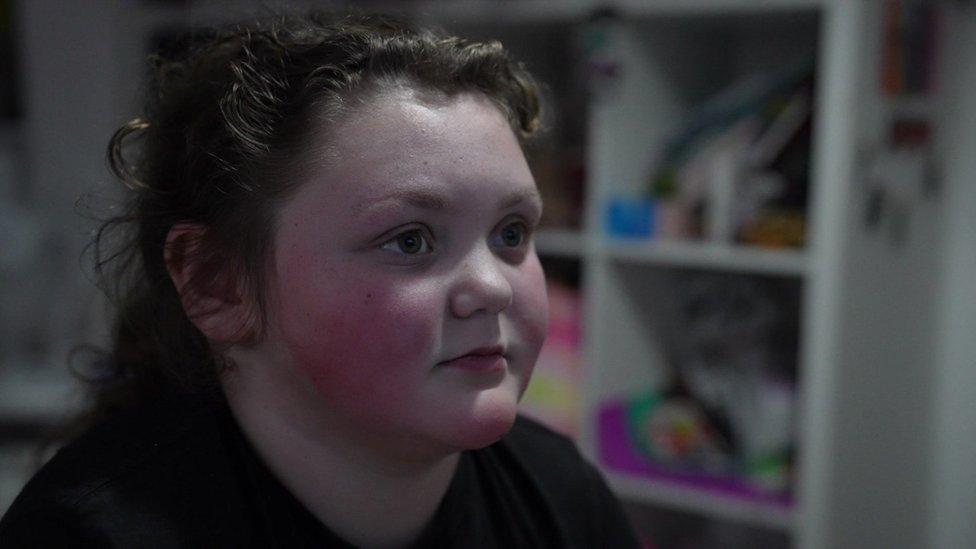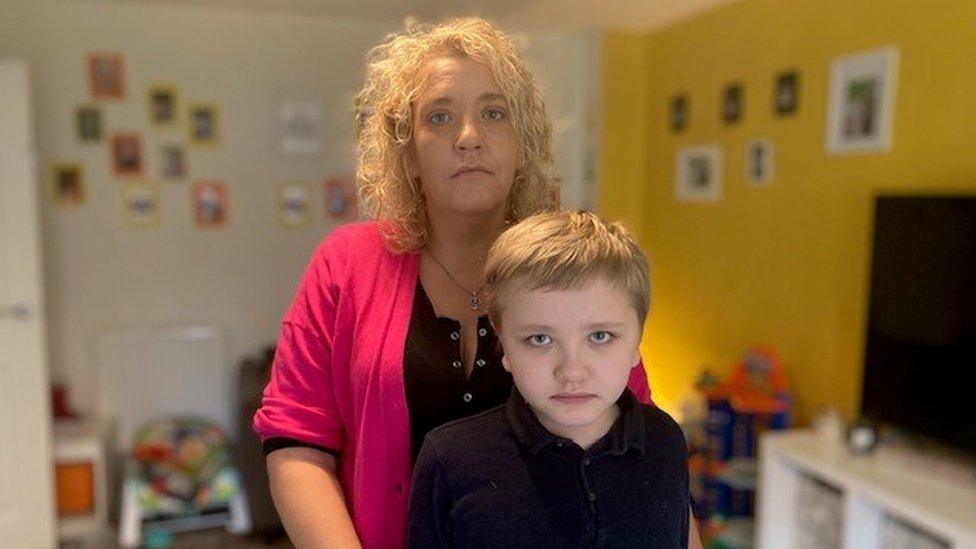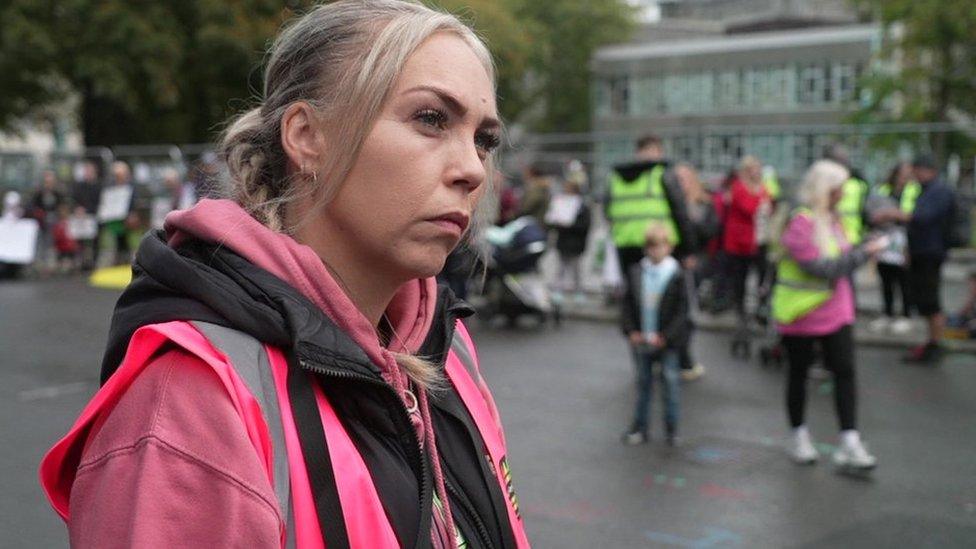EHCP: 'My autistic daughter has not been in school for 10 months'
- Published

Sarah, aged 10, has been out of school since February
Record numbers of parents who feel they lack proper support for their children with special educational needs and disabilities (SEND) are using legal tribunals to challenge councils' decisions. In nearly all cases, the parents are successful. The BBC spoke to two families about their experiences.
For school-aged children, the weeks leading up to Christmas are usually filled with trips to the pantomime, Christmas plays and exchanging cards with friends. But not for 10-year-old Sarah. She spends most of her time in her bedroom and has not been to school since February.
Sarah has ADHD, sensory processing disorder, and is autistic. She has struggled in mainstream education and her mother, Louise, says Sarah needs to be in a school that will cater for her needs. Louise adds that the situation is affecting the mental health of her daughter, who told her she would be "better off not here".
Louise has been battling to get Sarah a place at an appropriate school for the past 10 months, and the pressure on the family is taking its toll.
Parents of children with SEND have described the process that should deliver the support they need as "overwhelming" and "demoralising".
A record number of families have registered a tribunal appeal to get an Education and Health Care plan (EHCP) for their children.
The process to get an EHCP, which is a legal document outlining the support a child needs, is often lengthy, and can lead to costly tribunals between parents and local authorities.
'The system needs to work better'
New figures from the Ministry of Justice (MoJ) show 13,658 families registered an appeal compared to 11,052 the previous year - an increase of 24%. This is nearly four times higher than in 2014, when EHCPs were introduced.
Of the 7,968 decisions that made it all the way through to tribunal, 7,829 were ruled in favour of those making the appeal.
A Department for Education (DfE) spokesperson said: "The vast majority of education, health and care needs assessments and plans are concluded without the need to resort to tribunal hearings."
They added the DfE knows "the system needs to work better for parents".
More than 1.5 million pupils in England have SEND, and the latest DfE figures show 517,000 children were given an EHCP this year - the highest on record.
However, the majority of appeals, 3,813, were about a local authority decision not to assess a child for an EHCP.
The number of initial requests for a plan rose 23% from 2021 to 114,000.
'Terrified of everyone'
Sarah's life is dominated by her diagnosis, her mum says, and she is often withdrawn, has low self-esteem and no confidence.
Sarah has been issued an EHCP, but her mum does not feel it is "a true reflection of her need" and is contesting some of its contents.
Based on an assessment by an educational psychologist, the plan states Sarah can attend a mainstream school, but Louise argues that is not the right place for her daughter and wants the council to name a specialist school in the plan.

Sarah has struggled with her mental health since being out of school
Data shows this is the part of EHCPs that families contest most.
Sarah's family has spent £2,500 to get her assessed by a private educational psychologist and occupational therapist, who both suggest she should be in a specialist school.
Louise says the prolonged process has put a lot of "strain on her own mental health as well as her and her husband's relationship".
She is due to go to tribunal in January, joining the thousands already in the system.
'Broken system'
Chrissy Meleady runs Equality and Human Rights UK, and has been helping Louise and other families like her.
She is currently looking after 500 cases - all of them families appealing their EHCP and due to go to tribunal.
Data from the MoJ shows 98% of local authority decisions were overturned in favour of families last year.
Chrissy says the "system is broken" and many families she deals with are having "nervous breakdowns".
She says it is not uncommon for families to take out loans to pay for private assessments for their children.
Underfunding from central government for local SEND provision, coupled with the growing number of children diagnosed with SEND, means councils are facing backlogs just to get children assessed.
'Smiles every day'
Once EHCPs are in place, children and families say they can be life-changing.
Josef, 11, has been attending a specialist school since September. His mother, Hannah, says she sees the difference in her son every day when he comes home smiling - something she says never happened when he was in mainstream school.
Josef was diagnosed with ADHD and autism when he was seven. Hannah says before he had an EHCP he was "surviving not thriving" in a mainstream primary school.

Josef's mum says he has been happy since moving to a specialist school
She describes trips to A&E after he had tried to hurt himself and said he would tell her it was a way of "punishing himself".
Hannah is a special educational needs solicitor who specialises in SEND cases, and says navigating the system, even for her, was "overwhelming".
She says parents she speaks to are often at the verge of giving up before they have even started.
Hannah's case did not end up going to a tribunal. The DfE says this is the case with most EHCP assessments and it plans to strengthen mediation between parents and councils to avoid them.
The government said "high-needs funding" for those with complex needs is rising to £10.5bn in 2024-25 - an increase of more than 60% since 2019-20.
However, the Local Government Association (LGA) says councils still face "significant financial challenges" when it comes to funding Send, and further "urgent" action from the government is needed.
Louise Gittins, a councillor and chairwoman of the LGA's children and young people board, told the BBC some councils would be forced to declare themselves bankrupt, because of their high spending on Send provisions.
She said councils have asked her "how are we going to fix Send because it's going to tip us over the edge?".
Related topics
- Published4 December 2023
- Published23 November 2023

- Published21 November 2023

- Published14 October 2023
